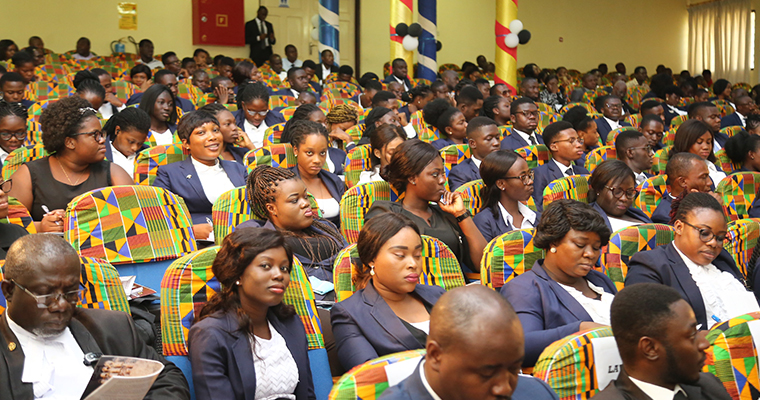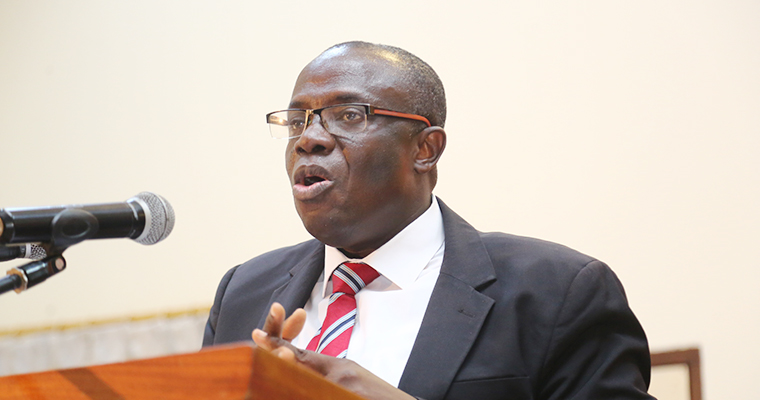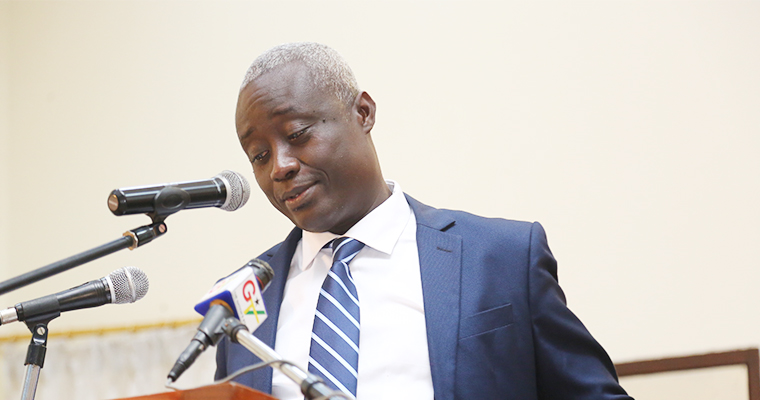A Justice of the Supreme Court, His Lordship Nene Amegatcher, has commended the National Accreditation Board (NAB) and the General Legal Council (GLC) for working together to regulate accreditation of law faculties in various tertiary institutions in the country.
Justice Amegatcher noted that hitherto, accreditation of new faculties was done by the NAB without the involvement of the GLC which approved universities whose students should be admitted to the Law School and subsequently called to the Bar in Ghana. He argued that “The provision in Section 4 of the Legal Profession Act, 1960 (Act 32) says that effective the first day of January, 1971, no person shall be qualified for enrolment into the Bar in Ghana unless the person is the holder of a degree from a university approved by the General Legal Council.
Justice Amegatcher was speaking at the UCC Faculty of Law Sixth Jurists’ Confab which was on the theme “Legal Education in Ghana and the Law Graduate: Challenges and Prospects”.

Students, stakeholders and the general public at the 6th Jurists' Confab
The Consequence of Sole Accreditation is Upsurge of Faculties Law
The Supreme Court Justice observed that the consequence of the sole accreditation of programmes was the upsurge of faculties of Law accredited without notice to the other regulator. “Without denigrating the deserved attention that other disciplines need when it comes to accreditation, accrediting law faculties is a duty that must not be taken lightly,” he noted.
Touching on other challenges facing Legal Education at the LLB level in Ghana, he said several other Commonwealth countries around the world faced the same challenges such as accreditation of law faculties; admission at the Law School after LLB; curriculum and teaching mode; motivation of Law Lecturers and staff development plan.
Engage Relevant Stakeholders to Better Place Legal Education
Justice Amegatcher stated that as a matter of urgency, there was the need to engage the relevant stakeholders continuously and holistically to better-place the Legal Education in the country to meet the changing dynamics of respective countries as well as global needs. He charged the Bar and Judiciary to hold regular colloquia such as the Jurists’ Confab for both law lecturers, students and stakeholders to discuss and identify the challenges and solutions for a robust legal education system.
Authorise Some Faculties of Law to Provide Legal Education Courses
The Dean, Faculty of Law, Ghana Institute of Management and Public Administration (GIMPA), Justice Sir Dennis Dominic Adjei, said that the challenges were due to increasing number of academic law graduates produced by the accredited law institutions in the country, to depend on a single professional law School – Ghana School of Law – which has an infrastructural deficit. Therefore, he stated that “In addressing the serious challenges faced by law graduates, I propose that some faculties of law should be authorised by the General Legal Council to provide professional Legal Education courses which are presently provided exclusively by the Ghana School of Law.

Justice Sir Dennis Dominic Adjei
Justice Adjei further explained that the Ghana School of Law should be used to coordinate the examination of students produced by those law faculties under the Independent Examination Committee established by the Legal Profession (Professional and Post-Call) Law Course Regulation, 2018 L1 2355.”
Prospects of Legal Education in Ghana
On the prospects of Legal Education in Ghana, he recommended that there should be: infrastructural and industrial reforms at the Law School; progressive legal education and training; enhanced teaching and learning methods; emphasising alternative career path; creation of more opportunities and vacancies. He further mentioned embracing digitisation; paralegal services; internships programmes between law faculty and law firms and staff development plan for lecturers others. These according to him were some of the possibilities that would be of immense benefit to the law graduate and other endless prospects if the Legal Education was improved.
The Supreme Court Justice believed that “If the challenges presented therein are cleared, Legal Education in Ghana at the LLB level promises to churn out law students are all-round, knowledgeable both in theory and practice of the law and well-placed to respond, not only to the changing demands of the country in terms of law reforms and development, investment and technology but also to the trend of globalisation”.
Structural Reforms in Existing Legal Education System
A Senior Lecturer at the Ghana School of Law, Mr. Maxell Opoku-Agyemang, indicated that there should be structural reforms in the existing Legal Education System for training law professionals in the country. He explained that graduates who had acquired the academic qualification of Legal Education but had not pursued the professional and vocational training should be recognised as a lawyer (learned person).
Mr. Opoku-Agyemang pointed out that if the basic task of Legal Education was to provide the best education for a substantial number of law graduates to enter into the Legal profession or otherwise perform some functions as lawyers in society, then why should one necessarily pursue the professional course after going through the LLB programme. “The path from academic law to professional law should be a natural chord and any system which produces a break in such causation, in my view is a failure,” he pointed out.

Mr. Maxwell Opoku-Agyemang
Legal Education Should Create Seamless Path
Mr. Opoku-Agyemang explained that Legal Education should be the type of ‘education’ which would not create any seamless path from the legal academic through professional legal training to acquire the right skills and confidence to enrol and practice as a barrister and solicitor. “I am of the view that, Ghana School of Law should be reconfigured as the regulator to accredit legal training institutions and also serve as an Independent Bar Examination Centre for the candidates from accredited legal training providers,” he concluded.
Infrastructural Deficit a Barrier to Increase Enrolment to Ghana School of Law
The Director, Legal Education, Ghana School of Law, noted that the School’s major problem had been the inadequate facilities to cater for more applicants. Regardless of the infrastructural deficit, he hinted that the School could have admitted as many applicants as possible. He commended the Faculty of Law at UCC, for its contributions towards the success of Legal Education and Legal Professionalism in the country.
Train Robust Legal Professionals to Deal with Lawlessness
In his welcome address, Provost, College of Humanities and Legal Studies, Prof. F. E. Amuquandoh, commended the Faculty of Law for organising the 2019 Jurists’ Confab to address issues confronting Legal Education in Ghana. He mentioned that since lawlessness had been on the ascendency in the country and the world, there was the need to use the Legal faculties to train robust legal professionals to help get things rightly done in the country.
Confab to Propose Solutions to Challenges Confronting the Nation
Stating the purpose of the gathering, the Dean, Faculty of Law, Mr. Kujo E. McDave, explained that the Confab was held to create a platform members of the Bench, the Bar and other distinguished scholars to share and exchange ideas pertaining to developments in the Law with the view to proposing some solutions to the challenges confronting our nation.

